Truthdigger of the Week: Dean Baker
“We all misjudged the risks involved,” former Federal Reserve Chairman Alan Greenspan said in March 2010 of the housing bubble that led to the financial crisis. He forgot about economist Dean Baker.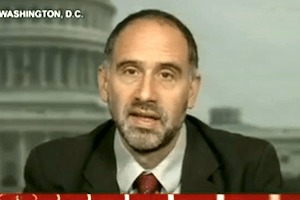
“We all misjudged the risks involved,” former Federal Reserve Chairman Alan Greenspan said in March 2010 of the housing bubble that led to the financial crisis. “Everybody missed it — academia, the Federal Reserve, all regulators.”
It’s not true. A paper published in 2002 by Dean Baker, co-founder of the Washington D.C.-based Center for Economic and Policy Research detected some clues, reporting that the rise in housing prices in the previous seven years exceeded what was expected given other aspects of the economy.
“There is … no obvious explanation for the increase in home purchase prices relative to rental prices,” Baker wrote in the paper’s conclusion. “In the absence of any other credible theory, the only plausible explanation for the sudden surge in home prices is the existence of a housing bubble. This means that a major factor driving housing sales is the expectation that housing prices will be higher in the future,” meaning that while “this process can sustain rising prices for a period of time, it must eventually come to an end.”
Four years later, almost a year before the crisis hit, Baker published another paper that predicted the collapse of the bubble would drive the American economy into recession.
“The result will be a downturn in consumption spending,” Baker wrote, “which together with plunging housing investment, will likely push the economy into recession.” The effects would be felt throughout society. “The economy will see a substantial net loss of jobs, with nominal wage growth slowing as the labor market weakens over the course of the year.”
Not only did Baker forecast that the collapse of the housing market would crash the economy, he anticipated that a response paralyzed by gridlocked politics would deepen the crisis and the suffering it caused for the middle and working classes. The economy’s recovery would depend on how quickly and forcefully the government responded, Baker wrote. The Federal Reserve would have to either fight the risk of inflation “associated with a declining dollar” or inject the economy with stimulus money.
“Since there may be no consensus for either path, it is very possible that [the Federal Reserve] will end up in an intermediate position where it lowers interest rates modestly, but does not act to aggressively counteract the slump,” Baker wrote. Fear over a growing deficit, which dominates the news and opinion media today, would further reduce the probability of Congress passing the necessary stimulus. ”It would be reasonable for Congress to enact a stimulus package including tax cuts and/or spending measures to counteract the slump; however, concern over the size of the deficit could prevent effective action.” And the absence of action could exacerbate the crisis. “If political factors prevent effective monetary and fiscal measures, then a slump caused by the collapse of the housing bubble could be prolonged considerably.”
In all of this, Baker was correct. One might think that his reputation as one of the few major economists to foresee the largest fiscal crisis the United States has seen since the Great Depression would win Baker the attention of the nation’s chief news outlets, but that hasn’t happened. Baker was right when every member of the establishment was wrong; therefore he was right at the wrong time. He is an outsider to Greenspan’s establishment clan and therefore doesn’t count among those the former chairman referred to when he said no one saw the crash coming. Greenspan would have been more honest in saying that “only the people who ignore what can be observed and instead subscribe to our ideological assumptions about economics missed it.”
Today, the same media that ignored Baker before the crash are giving short shrift to him in the discussion over the so-called fiscal cliff. Republicans claim the economy will collapse if the government doesn’t come up with a deal to cut spending and reduce the deficit by Dec. 31. In an appearance on “Democracy Now!” this week, Baker said that if a deal is not struck in time, the government will simply continue spending according to the previous arrangement until a deal is produced.
“[T]here’s an endless number of myths, but the first and foremost is that we face any sort of cliff,” Baker said. “You know, you’ve had this effort, certainly in Washington, to hype this December 31 deadline. Basically, if we miss that deadline, nothing happens. You know, you come to January 1, we’ll be subject to higher tax withholding rates. … I know there will be a hardship for some people, but the impact on the economy will be pretty much minimal.
“And on the spending side, President Obama … has enormous control over the pace of spending,” Baker continued. “And if there’s a deal outlined that—you know, outline of a deal that he sees with Congress, he’ll just keep spending in accordance with that deal. So this idea that, somehow, if we don’t get a deal by the end of the year, you know, we’re going to see the economy collapse, go into a recession, really that’s just totally dishonest. And I’ve seen that said I don’t know how many times. … [T]he basis for this is that we don’t have a deal all year. And the fact that you don’t have a deal December 31 does not mean you don’t get a deal by December 31, 2013. And I think everyone knows that.”
Politicians engaged in the fiscal cliff discussions who do know that appear to be willfully misinforming the American public. For providing those of us for whom economics is a dismal, foggy science with simple, evidence-based explanations, now and before the crash that began in 2007, we honor Dean Baker as our Truthdigger of the Week.
‘Democracy Now!’:
Your support matters…Independent journalism is under threat and overshadowed by heavily funded mainstream media.
You can help level the playing field. Become a member.
Your tax-deductible contribution keeps us digging beneath the headlines to give you thought-provoking, investigative reporting and analysis that unearths what's really happening- without compromise.
Give today to support our courageous, independent journalists.

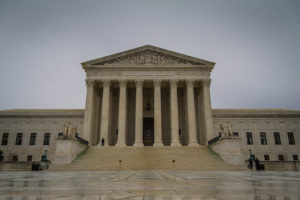
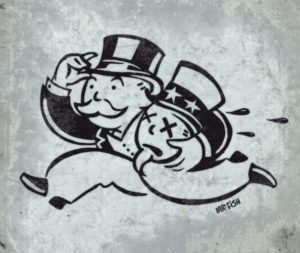

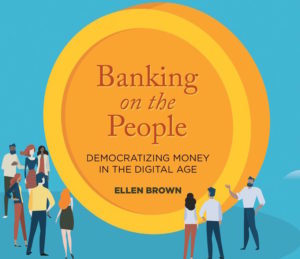
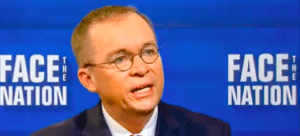
You need to be a supporter to comment.
There are currently no responses to this article.
Be the first to respond.